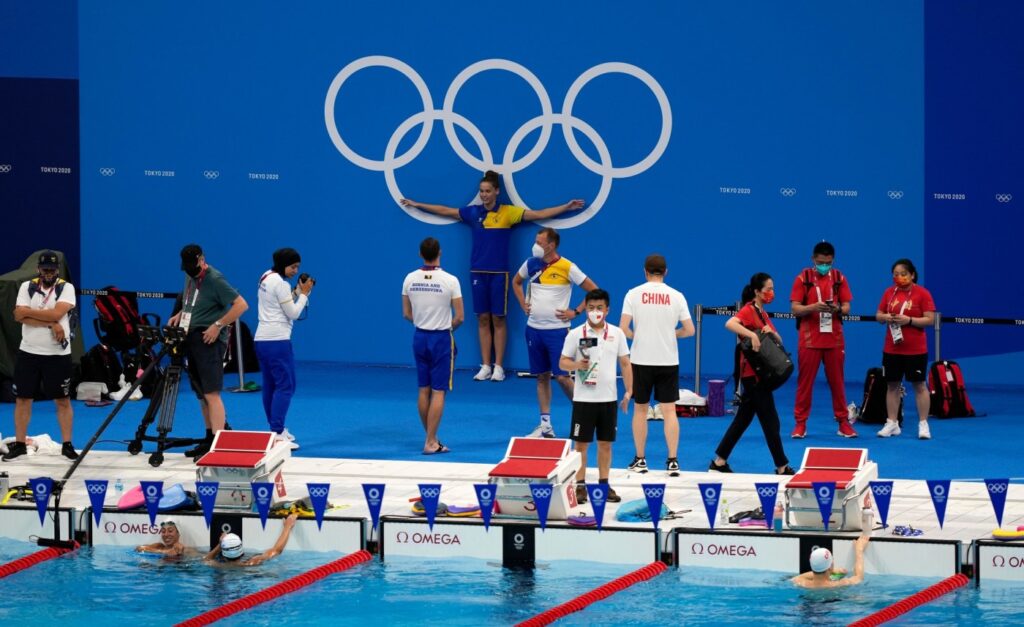
GENEVA — The international swimming federation says its top administrator has been ordered to testify as a witness in a U.S. criminal investigation into the case of 23 Chinese swimmers who failed doping tests in 2021 yet were allowed to continue competing.
The news comes just three weeks before the Paris Olympics, where 11 of the Chinese swimmers who tested positive for the banned heart medication three years ago are set to compete.
The swimmers won three gold medals for China at the 2021 Tokyo Olympics, just weeks after the World Anti-Doping Agency declined to challenge Chinese authorities’ explanation of food contamination at a hotel to justify not suspending them.
Those decisions, which World Aquatics separately reached also, were not revealed until reporting in April by the New York Times and German broadcaster ARD.
A House Committee on China asked the Justice Department and the FBI on May 21 to investigate the case under a federal law that allows probes into suspected doping conspiracies even if they occurred outside the U.S.
World Aquatics confirmed to The Associated Press on Thursday that executive director Brent Nowicki was subpoenaed to testify in the investigation.
“World Aquatics can confirm that its executive director, Brent Nowicki, was served with a witness subpoena by the United States government,” the federation said in a statement to AP. “He is working to schedule a meeting with the government, which, in all likelihood will obviate the need for testimony before a Grand Jury.”
World Aquatics declined to answer questions about where and when Nowicki was served his subpoena and didn’t say which office was handling the investigation.
“Per our standard practice, the FBI does not confirm nor deny the existence of an investigation,” the bureau said Thursday in an email reply.
The Chinese swimmers case could become the highest-profile use so far of a U.S. federal law passed in 2020 in fallout from the long-running scandal of Russian state-backed doping in sports.
The 23 swimmers tested positive for trimetazidine in January 2021 and those were filed weeks later in the global anti-doping database. They included Zhang Yufei, who went on take Olympic gold in the women’s 200-meter butterfly and 4×200 freestyle relay, and Wang Shun, the men’s 200 medley champion.
A later investigation by Chinese state authorities said traces of the substance were found in the kitchen of a hotel where the team stayed. No explanation has been given about how and why the drug prescribed in pill form got there.
WADA accepted the theory which allowed the Chinese swimmers to continue to compete, and has since described it as “a relatively straightforward case of mass contamination.”
The agency has since defended its handling of the case that was kept secret in 2021, saying it had no way to independently disprove the theory during the COVID-19 pandemic when travel to China was not possible.
Lawyers for WADA said in April this year they did not have evidence to win separate appeals against the 23 swimmers before the Tokyo Olympics. Any appeals seeking suspensions for the swimmers would have been heard at the Court of Arbitration for Sport, where Nowicki was a long-time senior counsel before joining World Aquatics in 2021.
“This scandal raises serious legal, ethical, and competitive concerns and may constitute a broader state-sponsored strategy by the People’s Republic of China to unfairly compete at the Olympic Games in ways Russia has previously done,” the Select Committee on the Chinese Communist Party said in the letter to the Justice Department and FBI.
The case was also raised at a congressional hearing last month in which swimming great Michael Phelps said athletes have lost faith in WADA as the global watchdog trying to keep cheaters out of sports.
Officials from the Montreal-based agency declined an invitation to come to the hearing, saying it would be “inappropriate to be pulled into a political debate before a U.S. congressional committee regarding a case from a different country, especially while an independent review into WADA’s handling of the case is ongoing.”
That review report is pending from a WADA-appointed former public prosecutor in the Swiss canton of Vaud that is home to the International Olympic Committee and governing bodies of many Olympic sports.
U.S. Anti-Doping Agency chief executive Travis Tygart suggested to The Associated Press an ongoing federal investigation could make sport officials traveling to the U.S. “fearful that they may have to answer questions about their activities from the FBI.”
The U.S. will host the 2028 Summer Games in Los Angeles, and in Paris on July 24 the IOC should confirm Salt Lake City as host for the 2034 Winter Games.
Related Articles
Alexander: Riverside County will be well represented in Olympic water polo
Sydney McLaughlin-Levrone sets world record in Olympic Trials finale
U.S. trials: Simone Biles secures third trip to the Olympics after breezing to victory
Fred Richard headlines a U.S. men’s gymnastics team that will head to Paris with a shot to medal
A dream finish: McKenzie Long joins Gabby Thomas on the Olympic team
The Rodchenkov Anti-Doping Act, named for a whistleblower who exposed Russian state-backed doping, passed with bipartisan backing. It received broad support from the global sports world for its aims to criminalize doping.
However, WADA lobbied against what it saw as a risk of overreach from the “extraterritorial” jurisdiction it could give to U.S. federal agencies, and the IOC also voiced concerns.
The Rodchenkov Act, Tygart said, “was enacted in 2021 with broad athlete, sport and multinational governmental support because WADA could not be trusted to be a strong, fair global watchdog to protect clean athletes and fair sport.”
